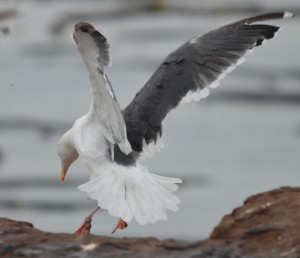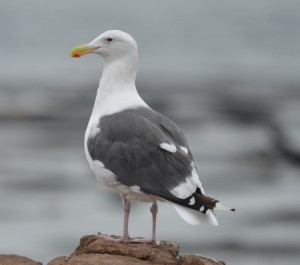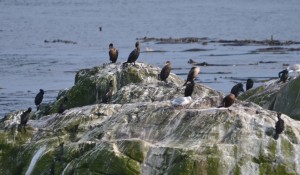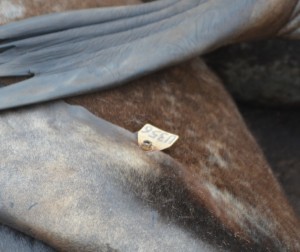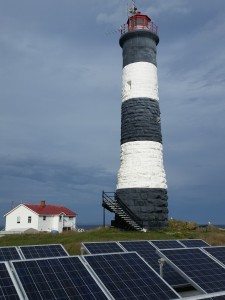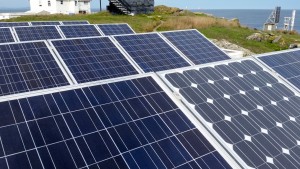Today was more of a fall day with cooler temperatures and a threat of rain in the air. Light levels were way down too. The barometer rose to 1014 hPA from a low of 1010 yesterday and it has just started to fall again. Rain and east winds of up to 25 knots are predicted to bring tomorrow’s forecasted rain, with a cool, wet outlook for the week ahead.
Thirteen visits to the protected area, by whale watching vessels, were observed today. Only one pleasure craft was noted.
There was a lot of cetacean action in and around Race Rocks for most of the day. It started with two big, bull, Biggs Killer Whales (Transients), travelling in from the west on the Rosedale side. They were later spotted in Race Passage and not long after an adult female Killer Whale was seen well inside the reserve by Turbine Rock. There were two Humpback Whales, one feeding just east of Race Rocks that moved west through Race Passage. It had a definite white splotch on the right fluke. The other one was feeding just west and had dark flukes, the same one, I think, that has been around for a while. There was also a Minke Whale feeding just to the south of Race Rocks.
Accumulated solar radiation levels today were less than half of what they have been for the last few days, 150 versus 300 to 350 Langleys and the days are getting noticeably shorter, faster now. Migrant species are moving through the reserve daily with hundreds of Surf Scoters moving through from west to east every day. All three species of cormorants are using the rocks here as roosts now and feeding in the multi-species flocks that surround the reserve with much commotion. This change into autumn not only impacts the biodiversity of the reserve but also has an impact on practical things like power generation.
Solar power has been producing over 90% of the power needed to run everything on the island and that amount will change over the next few months. Right now the shortfall is made up with a diesel generator but the plan is to move to cleaner burning propane in the near future. A great deal of progress has been made in reducing the amount of fuel stored and used here, from the days of the Coast Guard when there were six giant diesel tanks dominated the rock and the generators ran 24/7. A big shout goes out to Pearson College, for both reducing the ecological footprint in terms of CO2 and for reducing the risk of a spill.
- Western Gull landing.
- Western Gulls are much darker than the Glaucous-winged Gulls that nest here. The two species can hybridize which makes identification challenging sometimes.
- All three species of cormorants can be seen here, if you look carefully.
- This California Sea Lion’s tag U359, matches the brand which is not always visible.
- Old technology and new.
- Race Rocks operations depend on the sun for electricity.
